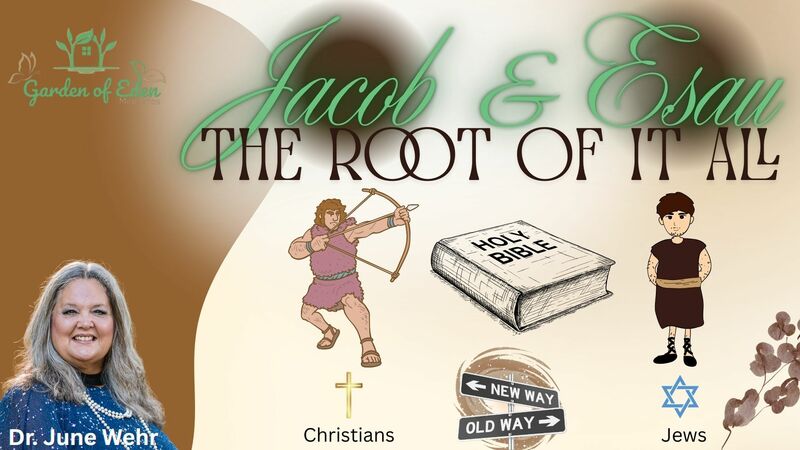
Jacob and Esau is a contraversial topic today. In modern-day Antisemitism agenda towards the real church, we must understand the battle between these two brothers. If you believe that Jesus IS God and that there is only one (1) covenant, and that Jesus is the ONLY way to Heaven, then you are considered ANTISEMETIC . So, we must know what we believe! We also hear from the Jewish perspective as well about Jacob and Esau.
Songs:
In the Name of Jesus
In the name of Jesus, in the name of Jesus,
we have the victory.
In the name of Jesus, in the name of Jesus,
Satan, you have to flee.
Oh, what can ever stand before us
when we call on that great name?
Jesus, Jesus, precious Jesus,
we have the victory.
Glorify Thy Name
Father, we love You
We worship and adore you
Glorify Your Name in all the earth
Glorify Your Name
Glorify Your Name
Glorify Your Name in all the earth
Israel & God
God became angry with the Israelites for complaining and being ungrateful for the manna He was providing, as their desire for meat was driven by discontent and a longing for the comforts of Egypt rather than genuine need. Their grumbling against God was a rejection of His provision and a failure to trust Him, which resulted in a plague and the deaths of many, serving as a harsh lesson in contentment and trust.
Reasons for God's anger:
-
Ungratefulness:
The Israelites had been sustained by manna, which was a miraculous provision from God, but they focused on what they lacked rather than giving thanks for what they had.
-
Discontent and Lust:Their complaint was not a true need but a desire for the variety of food they had enjoyed in Egypt, showing a greedy and selfish craving for more than they needed.
-
Rejection of God's Provision:By longing for the food of Egypt, they rejected God's loving and sufficient provision of manna, showing a desire to return to their former bondage.
-
Grumbling and Lack of Trust:Their constant whining and complaining were an expression of a deeper lack of faith and trust in God's ability to provide for them in the wilderness.
-
Incitement by others:A group of foreigners, or the "rabble," incited the Israelites to complain, further contributing to the unrest.
Consequences of their actions:
-
Plague and Death:
God, in His anger, sent a plague upon the people. A fire from the Lord also burned among the outskirts of the camp, destroying some people.
-
The Place of Kibroth Hattaavah:The people named the place "Kibroth Hattaavah," meaning "The Grave of Lust," to remember this event and their failure to be content.
-
A Lesson in Contentment:
The entire incident served as a stark reminder that God's judgment falls on ungratefulness and that true contentment comes from trusting and obeying Him
Jacob, also later known as Israel, is a central figure in the Old Testament, particularly in the Book of Genesis. He is the younger twin brother of Esau and the father of the twelve tribes of Israel. His life story is filled with significant events, including his deception of his father Isaac to obtain the birthright, his flight from Esau, his experiences with Laban, his wrestling with God, and his reconciliation with Esau.
Key Events and Themes in Jacob's Story:
-
Birthright and Blessing:Jacob, with the help of his mother Rebekah, deceives his father Isaac to receive the blessing intended for his older brother Esau.
-
Flight and Exile:Fearing Esau's wrath, Jacob flees to his uncle Laban's house in Haran.
-
Laban's Deception:Jacob experiences deception himself when Laban tricks him into marrying Leah before Rachel.
-
Return and Reconciliation:Jacob eventually returns to Canaan, after many years of living with Laban, and makes peace with Esau.
-
Wrestling with God:At Peniel, Jacob wrestles with a man (identified as God or an angel) and is renamed Israel, meaning "he struggles with God" or "God strives".
-
The Twelve Tribes:Jacob fathers twelve sons, who become the founders of the twelve tribes of Israel.
Significance:
Jacob's story is significant for several reasons:
-
Fulfillment of God's Promises:His life is intertwined with the fulfillment of God's promises to Abraham and Isaac, including the promise of a great nation and land.
-
Human Frailty and Divine Grace:Jacob's story highlights human weakness, deceit, and struggle, but also God's faithfulness, grace, and redemptive power.
-
Foundation of the Nation of Israel:Jacob's renaming as Israel and the birth of his twelve sons lay the foundation for the nation of Israel.
-
Symbol of God's People:Jacob, as Israel, becomes a symbol of God's people and their relationship with God.
Key Bible References:
- Genesis 25:19 - 50:26: The main narrative of Jacob's life.
- Genesis 28:10-22: Jacob's dream at Bethel and his encounter with God.
- Genesis 32:22-32: Jacob's wrestling with God and renaming as Israel.
- Genesis 35:9-13: God reaffirms the covenant with Jacob.
-
Hosea 12:3-5: A prophetic reflection on Jacob's character and his relationship with God.


